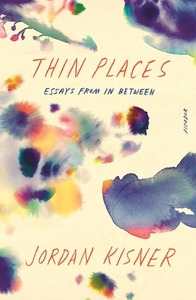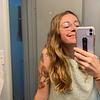Take a photo of a barcode or cover
challenging
emotional
hopeful
informative
inspiring
mysterious
medium-paced
This is a perfect book of essays. Haunting. Provocative. After reading the essay on morgues, I dreamed of a girl I knew from high school who’d died last month and I was helping her “pass through” something. This book will invade your life and your dreams.
emotional
hopeful
inspiring
reflective
medium-paced
One of my favorite books of the year. It is not often you read a book that, to very annoyingly quote J.D. Salinger, “when you're all done reading it, you wish the author that wrote it was a terrific friend of yours and you could call him up on the phone whenever you felt like it,” but this was that for me. From the first essay, I felt a kinship with Kisner. I furiously underlined thoughts that I felt were deeply personal to me, which she had somehow written out more eloquently than I could’ve imagined.
The thing that most struck me, though, outside of my own identification with so much of Kisner’s outlook, was how utterly compassionate she was with each subject. Whether she is writing about Evangelical Christians who scout new converts at clubs or about south Texas beauty pageants or about queerness or her own OCD, she never defaults to skepticism or mistrust. She always approaches the unknown with the possibility that it is more beautiful and complex than we assume. Because of that, she mines some wonderful insight from the most unexpected places.
I cannot believe this is her debut, and I cannot wait to follow her career.
The thing that most struck me, though, outside of my own identification with so much of Kisner’s outlook, was how utterly compassionate she was with each subject. Whether she is writing about Evangelical Christians who scout new converts at clubs or about south Texas beauty pageants or about queerness or her own OCD, she never defaults to skepticism or mistrust. She always approaches the unknown with the possibility that it is more beautiful and complex than we assume. Because of that, she mines some wonderful insight from the most unexpected places.
I cannot believe this is her debut, and I cannot wait to follow her career.
I will be reviewing this book in my 1/31/22 newsletter get it delivered to your inbox here --> www.tinyletter.com/ArtofKCF
This was my favorite essay collection I've read in a long time, and it made me want to write.
funny
hopeful
inspiring
reflective
relaxing
fast-paced
some essays interested me more than others, definitely relevant and interests ideas! gave me something to chew on but lost its flavor in the second half
I heard Jordan read from her work in Charlottesville about four years ago and during that reading thought to myself, I cannot wait for this person to have a book. And now she does and it has lived up to my wild expectations! These essays are smart and honest, playful and wise, they weave observation and research with personal experience in ways that garnered insights, moments of pause and reflection. They are ordered in a way that creates stitches across the essays--even as they were written at separate times, for separate occasions, they feel cohesive, thoughtfully arranged. I can't wait for her next book, though I will wait happily, as I know good art requires heaps of time.
Jordan Kisner announces herself humbly as a master of her genre, with essays that exude brilliance individually and then perhaps even more so as a carefully ordered collection. Her "thin places" are the spaces where "the barrier between the physical world and the spiritual world wears thin and becomes porous. Invisible things, like music or love or dead people or God, might become visible there." There's no way to walk away from her collection without feeling as if you live in a thin place-- as if you might never have to leave it. Reading her feels like listening to that guitar part in a favorite song when all other sound falls away and then, suddenly, your body falls away, and your self spreads to take up the entirety of a room. Kisner writes about OCD and the boundaries of selfhood, about a New York artist using empty space as a feminine medium, about a Martha Washington pageant obsessed with lineage held on the Laredo, Texas and Nuevo Laredo border. She writes of young Christians clubbing and converting during summers spent in Montauk, of forensic pathologists in Ohio quietly defending the dead who can no longer speak for themselves. She writes along tightropes, but in the world of her mind, these spaces widen to become comfortably navigable pathways. In a world that seeks to erase the spaces between, this may be the most important book you read this year.





